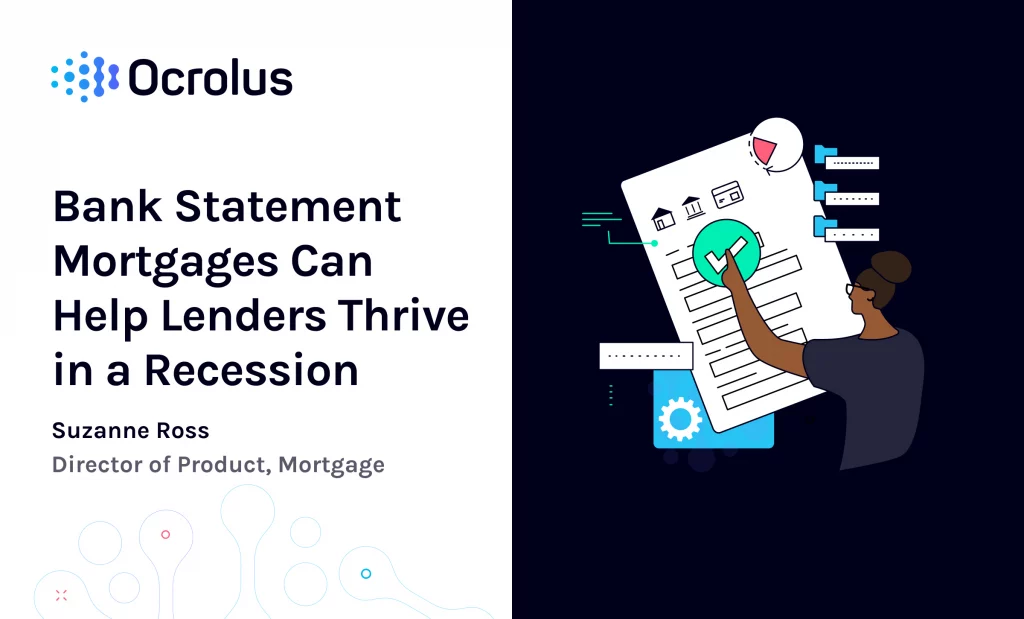This website uses cookies so that we can provide you with the best user experience possible. Cookie information is stored in your browser and performs functions such as recognising you when you return to our website and helping our team to understand which sections of the website you find most interesting and useful.
Bank Statement Mortgages Can Help Lenders Thrive in a Recession

The signs of a potential recession are steadily approaching. In fact, according to a recent survey with leading macroeconomics, almost 70% of respondents believe that the United States will enter a recession in 2023. Moreover, in Europe, top CEOs “see a big recession in the making” while former Bank of Canada and Bank of England governor Mark Carney says that the risk of a coming global recession is “uncomfortably high.”
An unstable economy typically makes lenders more cautious, and in the case of residential mortgages, it means fewer originations as lenders focus on reducing risk. Thanks to advances in data automation technology, lenders no longer have to go into hedgehog mode, as has been the conventional modus operandi in times of recession. By integrating advanced document automation software that makes bank statement analysis easier and more accessible, lenders can add bank statement loans to their offerings, while highly accurate lending decisions regardless of market conditions.
What’s coming?
The Federal Reserve, Bank of England, and Central European Bank have all committed to their own interest rate hike cycle to help reduce the inflationary pressures their economies are facing. The Consumer Price Index in the United States rose to 8.6% in May 2022, and 9.1% in June, a 41-year high. However, inflation is starting to cool and prices are beginning to stagnate.
Investors and economists alike are worried that these monetary policy measures are too aggressive and will generate too much instability for their economies. In the U.S., the Fed is leaning towards another 75-basis-point hike. The last time the Fed raised rates by 75 basis points was in 1994.
How do recessions usually impact mortgage lenders?
Recessions are typically associated with large numbers of job losses, as companies lay off employees and often go out of business. As a result, there is an increase in mortgage repayment defaults, and home repossessions rise. To stay afloat, lenders have to confront these losses while also preventing further losses. Lenders have had to absorb significant mortgage repayment losses in the past, making them understandably more reticent about originating more loans during a recession.
While this means a lower risk of originating loans to bad debtors, it also means that lenders may reject applications from potentially good loan applicants. Up to now, it has typically been an accepted, undesirable eventuality that lenders will lose a lot of lending business in a recession. However, this doesn’t have to be the case. Data automation and a relatively new way of assessing each application—via verified bank statements—can empower lenders to minimize the usual loss of mortgage loan business that a recession causes.
Harnessing intelligent automation
Bank statement analysis can equip lenders to offer more flexible products to mortgage applicants. Moreover, employees are increasingly opting for freelance work rather than the traditional 9-5. In the United States, over 57 million workers are freelancers. This number is only set to grow, meaning fewer borrowers will fit the traditional application process with paystub and W-2 attributed income. Lenders that continue to rely on this traditional approach, will see their projected mortgage applicant pool vanish.
Automated bank statement analysis can be a core component of an agile, non-QM loan program. This gives lenders detailed insights into a loan candidate’s cash flow and financial situation and money management capabilities, better gauging their repayment ability.
Automating bank statement data efficiently
Lenders can reduce the steep declines in mortgage volume during a recession with the right data automation capabilities. Ocrolus enables lenders to make faster, more accurate lending decisions at scale with intelligent document automation.
By applying Ocrolus document processing to bank statement analysis, lenders can help recession-proof their businesses. They’ll be able to continue identifying mortgage applicants with low-risk profiles that could be rejected using traditional underwriting methods. Sign up for a free trial






